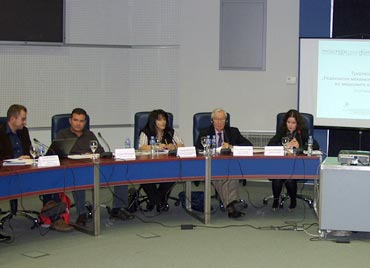| |
|
| UNESCO starts series of events under media accountability project UNESCO started the implementation of its project, Alignment to International Standards in the Media Sector of South-East European Countries, in the former Yugoslav Republic of Macedonia. On 20 October 2009 the Macedonian capital Skopje hosted the first national roundtable of the project, which aims at encouraging, assisting and accelerating media reforms in the South-East European countries. |
News |
UNESCO started the implementation of its project, Alignment to International Standards in the Media Sector of South-East European Countries, in the former Yugoslav Republic of Macedonia. On 20 October 2009 the Macedonian capital Skopje hosted the first national roundtable of the project, which aims at encouraging, assisting and accelerating media reforms in the South-East European countries.
The Skopje roundtable was the first in a cycle of national events, which will take place in each country participating in the programme: Albania, Bosnia and Herzegovina, Croatia, Montenegro, Serbia, the former Yugoslav Republic of Macedonia, Turkey and Kosovo.
The two-and-half-year project, which began in 2008, is funded by the European Commission and implemented by UNESCO. Its goals are to support consolidating European Standards on Media, to establish effective, functioning, self-regulatory mechanisms and to create a network of interested and expert contributors. For these purposes, after an international kick-off event, UNESCO has launched a cycle of national roundtables: each event will initiate the process of establishing a self-regulatory mechanism and/or newsroom ombudsman mechanisms in the country. The meetings are organized in collaboration with the South-East European Network for the Professionalization of Media (SEENPM), which is an umbrella organization uniting 18 media centres and institutes from the region, and OSCE. The national roundtable held in Skopje successfully started this process in Macedonia. The event, organized in cooperation with the Macedonian Institute for Media and the Journalists’ Association of Macedonia, was attended by approximately 40 representatives of the media, including the Broadcasting Council, the Union of Syndicates, the President of Journalists’ Association of Macedonia and the President of the Council of Honour (the only self-regulatory mechanism in the country). The meeting was opened by two international speakers, Prof. Robert Pinker, from the UK Complaints Commission, and Ognian Zlatev, Director of the Media Development Centre in Sofia. Prof. Pinker spoke about Macedonia's aspirations to join the European Union and explained that free and professional media are among the evidences of the functioning of a democracy. In this context, he added that the existence of an authority for media self-regulation can ensure the protection of press freedom, as well as the protection of the public from possible abuse by the media. "The existence of an independent authority for media self-regulation is necessary to raise the credibility of the media, to minimise the number of court cases against journalists and to assist in resolving conflicts,” said Mr Zlatev. He pointed out that there is no universal model for self-regulation in Europe; however the best model is the one which includes journalists, publishers, media owners and the public. The presentations by the key speakers were followed by lively discussions. Interesting examples came from the participants who spoke about the ongoing crisis in the country’s media industry, the implementation of the Law on Broadcasting Activity and relations between regulation and self-regulation (co-regulation). Most participants stressed the need for increased protection of editorial policy from the influence of media owners on news content; and pro and contra arguments were elaborated on the effectiveness of self-regulatory efforts to contest this practice, which is ongoing and is increasing to a significant point. The participants agreed that the media community in Macedonia should be mobilised in order to create a broad platform to introduce self-regulation in the press, electronic media and the Internet, following the best European practices and respecting the professional standards and ethical values of the media. A broad discussion should be initiated about the need for eventual introduction of a media law, through a process that would include all relevant actors: the public, prominent intellectuals, media professionals and experts, editors, and media owners from all parts of the country. 
The Skopje roundtable
© UNESCO Related themes/countries
· Europe and North America · The former Yugoslav Republic of Macedonia · Professional Journalistic Standards and Code of Ethics |
Contact information
Related Links
More resources
|
|
portal1.org we are portal 1 Community of Practice Software Solutions - Powered by Tomoye Simplify Version 3:01b |
UNESCO-CI
Have feedback? Email the Chief Editor Portal Statistics: 23292 knowledge objects - 6499 topics |
||